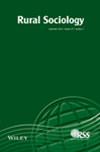Migration Across Metro-Nonmetro Boundaries and Hourly Wages☆
IF 1.9
3区 社会学
Q2 SOCIOLOGY
引用次数: 0
Abstract
Previous scholars have demonstrated that nonmetro residents who move to metro areas earn higher wages. It remains an open question whether this metro wage advantage persists in the contemporary era, and how migrating influences young adults from metro areas. Migrants may earn higher wages due to higher education. Alternatively, they may earn lower wages because they lack social capital. They may experience different associations of migration and wages when growing up in nonmetro versus metro areas due to different family backgrounds, education, and community contexts. This article uses data from the National Longitudinal Study of Youth 97 and multilevel/mixed-effects models to test these competing predictions. The findings show that young adults earned higher wages if they worked in metro rather than in nonmetro areas, regardless of migration, confirming a metro wage advantage. People who left nonmetro areas earned higher wages than if they stayed, consistent with a “rural brain drain.” In addition, people earned similar wages if they stayed in, returned, and moved from metro to nonmetro areas, even though migrants and returnees had higher average education. The non-significant wage differences may be due to the less diverse wage structure in nonmetro labor markets and in-migrants' lack of social capital.

跨地铁-非地铁边界的移民和小时工资
以前的学者已经证明,搬到大都市地区的非大都市居民收入更高。这种大都市的工资优势在当代是否仍然存在,以及移民如何影响大都市地区的年轻人,这仍然是一个悬而未决的问题。由于受高等教育,外来务工人员可能挣得更高的工资。或者,他们可能因为缺乏社会资本而获得较低的工资。由于不同的家庭背景、教育和社区背景,他们在非大都市地区和大都市地区长大时,可能会经历不同的移民和工资联系。本文使用来自国家青年纵向研究的数据和多层次/混合效应模型来检验这些相互竞争的预测。研究结果显示,无论移民情况如何,在大都市地区工作的年轻人比在非大都市地区工作的年轻人工资更高,这证实了大都市的工资优势。离开非都会区的人比留在那里的人挣得更高的工资,这与“农村人才流失”是一致的。此外,即使移民和海归的平均受教育程度更高,但如果他们留在、返回并从大都市地区迁移到非大都市地区,他们的工资水平也差不多。这种不显著的工资差异可能是由于非城市劳动力市场的工资结构差异较小以及外来移民缺乏社会资本。
本文章由计算机程序翻译,如有差异,请以英文原文为准。
求助全文
约1分钟内获得全文
求助全文
来源期刊

RURAL SOCIOLOGY
SOCIOLOGY-
CiteScore
4.60
自引率
13.00%
发文量
47
期刊介绍:
A forum for cutting-edge research, Rural Sociology explores sociological and interdisciplinary approaches to emerging social issues and new approaches to recurring social issues affecting rural people and places. The journal is particularly interested in advancing sociological theory and welcomes the use of a wide range of social science methodologies. Manuscripts that use a sociological perspective to address the effects of local and global systems on rural people and places, rural community revitalization, rural demographic changes, rural poverty, natural resource allocations, the environment, food and agricultural systems, and related topics from all regions of the world are welcome. Rural Sociology also accepts papers that significantly advance the measurement of key sociological concepts or provide well-documented critical analysis of one or more theories as these measures and analyses are related to rural sociology.
 求助内容:
求助内容: 应助结果提醒方式:
应助结果提醒方式:


